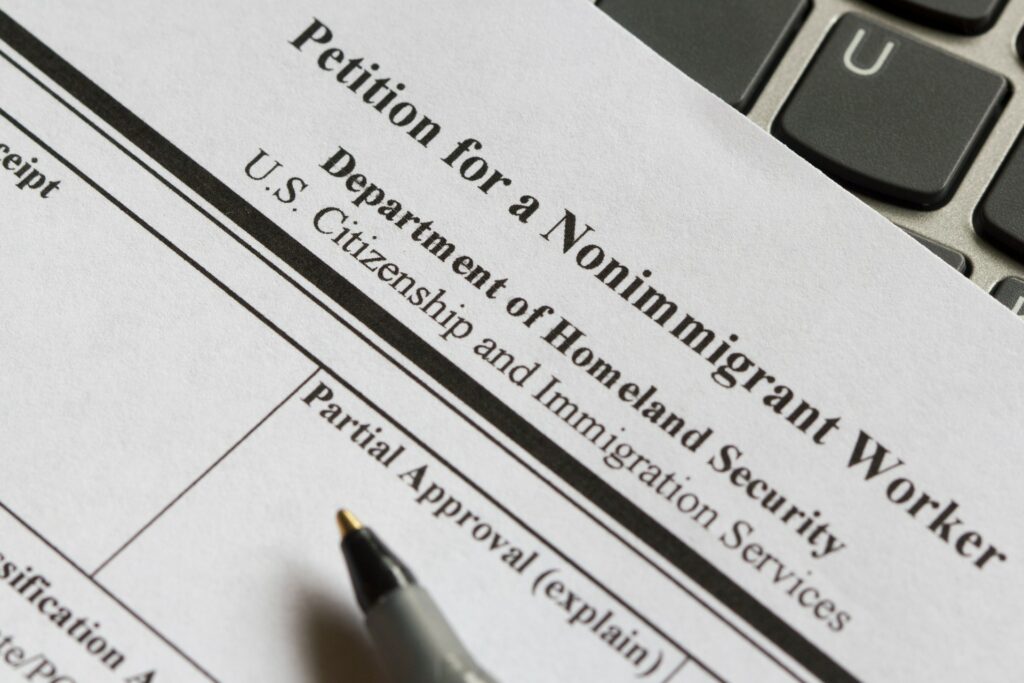The Department of Homeland Security (DHS) released a final rule in mid-December aimed at modernizing and improving the efficiency of the H-1B program.
The rule, which is 460 pages, is set to go into effect on Jan. 17, 2025, and “will add benefits and flexibilities, and improve integrity measures,” according to DHS. The organization also implemented two other final rules related to the H-1B visa program earlier this year.
Below are some highlights of the new H-1B final rule.
Facts and information to know
— United States Citizenship and Immigration Services (USCIS) published a proposed rule in October 2023 related to the H-1B visa program. The final rule earlier this month officially finalizes some provisions listed in that proposal. Other measures from the initial proposed rule were finalized in early January 2024, more details about which follows in a later section.
— The final rule released in mid-December codifies the department’s “deference” policy “when adjudicating a Form I-129, Petition for Nonimmigrant Worker involving the same parties and the same underlying facts.” In these cases, USCIS officers will continue to generally defer to the earlier “determination on eligibility, unless a material error in the prior approval is discovered or other material changes or information impacts the petitioner’s, beneficiary’s, or applicant’s eligibility.”
— Another key portion of the rule clarifies and modifies the criteria used to define a “specialty occupation.” In the initial proposed rule, USCIS said it intended to change the definition of a specialty occupation to clarify that there “must be a direct relationship between the required degree field(s) and the duties of the position.” However, DHS elected not to implement that definition as proposed because of feedback it received that the “language may be misread to conclude that USCIS would only consider a beneficiary’s specialized studies in assessing whether the position is a specialty occupation.” The organization will still maintain the “directly related requirement in the definition of specialty occupation and related criteria.” It will also add “language clarifying that directly related means there is a logical connection between the degree or its equivalent, and the duties of the position.”
— The new rule also “clarifies that although the position may allow for a range of qualifying degree fields, each of the fields must be directly related to the duties of the position.”
— Further, the rule provides “additional flexibilities” for nonprofit and government research organizations. This change will allow groups that conduct research as a fundamental activity but are not primarily engaged in research or where research is not a primary mission to meet the regulatory definition of a nonprofit research entity.
— Moreover, the new rule changes the requirement that foreign nationals must be directly employed by a qualifying organization to be eligible for an H-1B cap exemption. Instead, certain foreign nationals can receive an exemption “when they are not directly employed by a qualifying organization, but still spend at least half of their time providing essential work that supports or advances a fundamental purpose, mission, objective, or function of the qualifying organization.”
— A new edition of the Form I-129, Petition for Nonimmigrant Worker will be released in the coming weeks to coincide with the implementation date of the new final rule, with an effective date of Jan. 17, 2025.
— The new final rule will also “narrowly impact” the H-2, H-3, F-1, L-1, O, P, Q-1, R-1, E-3 and TN visa petitions, according to DHS.
Earlier final rules related to H-1B program
The DHS under the Biden administration made some key changes earlier this year which were in effect for the latest H-1B FY2025 cap lottery.
The organization released a final rule in January 2024 which specified that each cap-subject beneficiary was only registered for the H-1B cap lottery once, regardless of how many registrations were submitted in their name.
That change ensured each beneficiary had the same odds of selection and prevented organizations from misusing the registration system by filing multiple registrations for a single beneficiary. Every H-1B applicant needed to submit a valid passport or travel document information with their initial registration.
Further, the new rule allowed USCIS the ability to deny or revoke H-1B petitions where the “underlying registration contained a false attestation or was otherwise invalid.” Under the new rule, USCIS can also rescind or reject an H-1B petition if it finds the registration fee was “declined, not reconciled, disputed or otherwise invalid.” The new rule also permitted some filings “with requested start dates that are after Oct. 1 of the relevant fiscal year, consistent with current policy.”
Additionally, USCIS unveiled “organizational accounts” for fiscal year (FY) 2025 H-1B cap filings as well as cap-exempt petitions. Multiple members of an organization, including both business and legal representatives, can work together inside the organizational account portal to complete the H-1B registration; the Form I-129, Petition for a Nonimmigrant Worker and the associated Form I-907, Request for Premium Processing Service. The Form I-129, H-1B petitions and the Form I-907 premium processing request for the Form I-129 H-1B petition can be filed online via the organizational account.
What is the H-1B visa program?
The H-1B nonimmigrant visa category is available for U.S. companies to fill a “specialty occupation” with a qualified foreign national. A specialty occupation is one that generally requires a bachelor’s degree or higher, or its equivalent, as a minimum, entry-level credential.
In most situations, an H-1B petition can be approved for a maximum initial period of three years and may be extended for an additional three years longer under certain circumstances.

